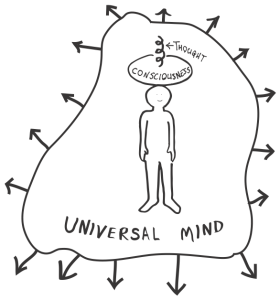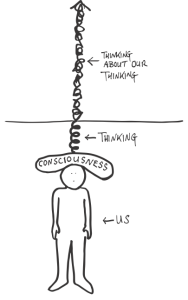The more accurately you can see how things work, the less superstitious you need to be. And the secret to being at your best when it matters most is not your lucky briefcase, your girlfriend’s underwear, or how many magpies you saw on the way to the big game. It’s simply taking advantage of how the human system actually works.
Here’s how I wrote about it in The Space Within:
For example, resilience – the ability to bounce back from any setback – is both natural and built into the human system. As any six-month-old baby would tell you (if they could talk, obviously), no matter how upset you are and no matter how big a tantrum you’re throwing, you’re only one thought or good cuddle away from returning to the quiet and peace of the space within. We adults, however, tend to think of resilience as a skill we have to develop if we want to let go of the upsets and tantrums that many of us have been nurturing for years.
Like resilience, wellbeing, confidence, learning, and creativity are already built into the human system. They’re as natural a part of how we’re designed to operate as plants turning sunlight into energy and the human body turning food into fuel. By way of contrast, building a business, playing the piano, coaching a sport, and even writing books are not things that we’re either intrinsically good at or not – they’re learnable skills that will develop given time, effort, instruction, and practice.
Because most of us confuse what’s normal with what’s natural, we struggle along in first or second gear most of the time, maybe even happily thinking that 30 miles per hour is as fast as a car is meant to go. But as we gain a better understanding of how cars actually work, we come to realise that instead of pushing the engine harder and harder in a low gear, we can simply shift to a higher one. We’ll get better performance and reach higher speeds with less wear and tear on the engine and parts.
When it comes to human performance, that ‘gear shift’ starts to happen automatically as we learn a bit more about how the system works. Almost without noticing, we begin to get far more done with far less effort.
In traditional coaching, that gear shift is often explained with some version of this formula:
performance = capacity + information
If that were true, the only thing between you and optimal performance would be a missing piece of information. Once you knew what to do, you would get the most out of your innate capacity.
But even a cursory glance at our own life will show up the fallacy in that idea. How many ‘strategies for success’ have we studied in our lifetime? How much of what we know do we actually apply? Are our results commensurate with what we know, or do they seem to have more to do with what we actually do?
The actual formula for high performance looks more like this:
performance = capacity – interference
In other words, when we eliminate interference, we perform closer to our full capacity. But in order to eliminate interference, we first have to understand what it is and where it comes from.
Here’s a visual representation of how our mind functions when we’ve got our mojo working – in the zone and on our game:

When we’re operating in sync with our natural design, we’re tuned in and receptive to the infinite potential of the universe (Mind). We’re able to experience the energy of the universe taking form (Thought) via an aperture that is continually expanding and contracting (Consciousness).
To function at our absolute best, all we need to do is allow the system to operate as designed. Thought takes form in our personal consciousness as fresh ideas, creative possibilities, loving thoughts, and a moment-by-moment sense of direction, and we move forward in absolute harmony with the intelligence of the universe made manifest via our common sense and a sort of ‘wisdom within.’
What could possibly interfere with such a great design?
Well, the problem with a brain is that over time it starts to produce lots and lots of repetitive ‘personal thinking’ over and above whatever ‘fresh-from-the-cow thinking’ we really need to perform at our best. Since our experience of life is really an experience of Thought, the more we have on our mind, the more complicated everything seems, and the more the aperture of our consciousness tends to contract. Before we know it, all we can see when we look out into the world is our own thinking reflected back to us in the fun-house mirror of our own self-consciousness.
Where we get ourselves into real trouble is when we then start analyzing and attempting to control our thinking. In the process, we completely lose sight of both the power of Thought and the intelligence of the deeper Mind that can guide us through life with relative ease if we let it.
It looks something like this (but not this):

Simply put, the less we have on our mind, the higher our level of performance. The more we have on our mind, the more we’re prone to behave like a bit of a mor(e)on…
With all my love,
![]()






